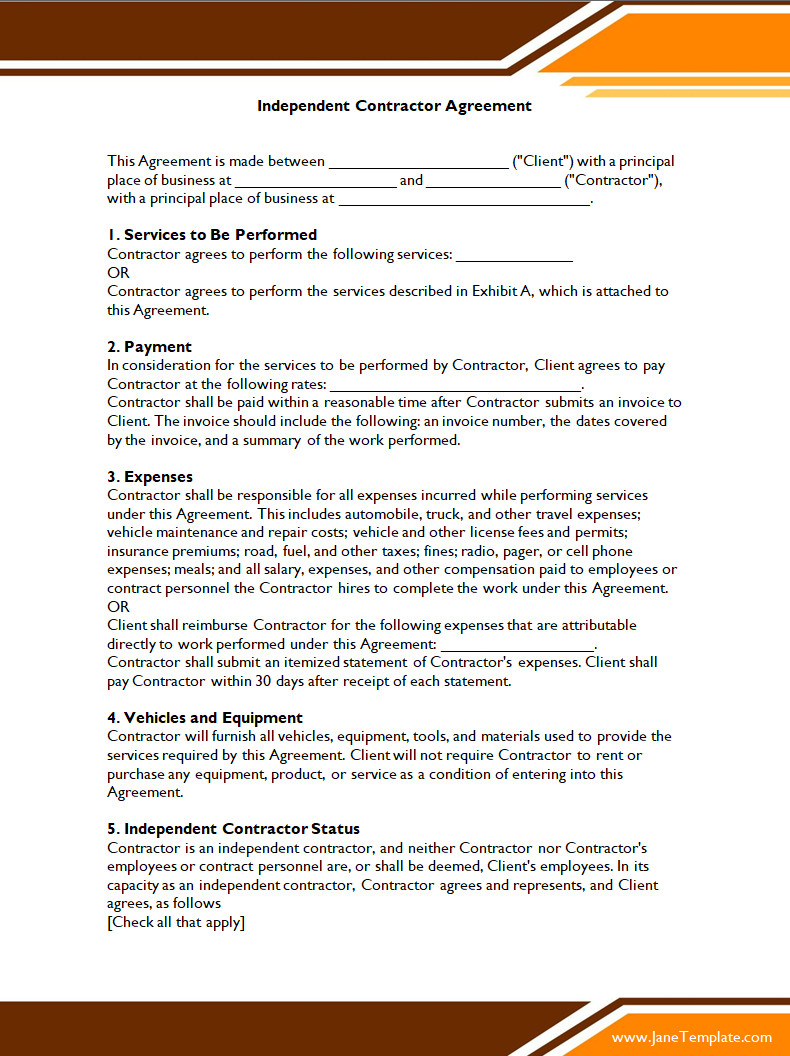When hiring self-employed individuals for specific projects or services, an independent contractor agreement is essential to formalize and legally outline the terms of the business relationship between a company and the contractor.

This contract serves to protect both parties by defining the scope of work, payment terms, and the contractor’s independent status. By establishing clear expectations and ensuring the contractor is not misclassified as an employee, an independent contractor agreement helps mitigate the risk of misunderstandings or legal disputes.
What Is an Independent Contractor Agreement?
An independent contractor agreement is a written contract between a company and a self-employed individual who will be providing services or completing projects for the company.
This agreement outlines the terms of the business relationship, including the scope of work, payment terms, deadlines, confidentiality agreements, intellectual property rights, and any other relevant details.
Independent Contractor vs. Employee: What’s the Difference?
It’s important to distinguish between independent contractors and employees, as misclassifying workers can lead to legal and financial consequences for employers. Independent contractors are self-employed individuals who are hired on a project-by-project basis or for specific services, while employees work for a company on a regular, ongoing basis.
The key differences between independent contractors and employees include:
- Control. Independent contractors have more control over how they complete their work, while employees are typically subject to more supervision and direction from the company.
- Payment. Independent contractors are usually paid per project or service, while employees receive a regular salary or hourly wage.
- Benefits. Employees are eligible for benefits such as health insurance, paid time off, and retirement plans, while independent contractors are responsible for their own benefits.
Benefits of Independent Contractor Agreements
There are several benefits to using independent contractor agreements for business relationships with self-employed individuals:
- Clarity. An independent contractor agreement helps establish clear expectations for both parties regarding the scope of work, payment terms, and other important details.
- Legal Protection. By formalizing the terms of the relationship in a contract, both parties are protected in the event of disputes or misunderstandings.
- Independent Status. Defining the contractor as an independent worker helps ensure they are not misclassified as an employee, avoiding potential legal issues.
Limitations of an Independent Contractor Agreement
While independent contractor agreements offer many benefits, there are limitations to consider:
- Enforceability. The enforceability of an independent contractor agreement may vary depending on local laws and regulations.
- Scope of Work Changes. If the scope of work changes during the contract period, the agreement may need to be amended to reflect the new terms.
- Independent Contractor Status. It’s important to ensure that the contractor truly meets the criteria for independent contractor status to avoid misclassification issues.
When Should You Use an Independent Contractor Agreement?
You should use an independent contractor agreement whenever you hire a self-employed individual to complete specific projects or provide services for your company. This type of agreement is necessary to formalize the terms of the business relationship and protect both parties involved.
Parts of an Independent Contractor Agreement
An independent contractor agreement typically includes the following key sections:
- Introduction. This section outlines the parties involved in the agreement and the date of the contract.
- Scope of Work. Details the specific tasks or projects the contractor will be responsible for completing.
- Payment Terms. Describes how and when the contractor will be paid for their services.
- Confidentiality Agreements. Provisions outlining the protection of sensitive company information.
How to Create an Independent Contractor Agreement
When creating an independent contractor agreement, it’s important to include the following elements:
- Clear Language. Use clear and concise language to outline the terms of the agreement.
- Specific Details. Be specific about the scope of work, payment terms, deadlines, and any other relevant details.
- Consultation. Consider consulting with a legal professional to ensure the agreement complies with local laws and regulations.
An independent contractor agreement is a crucial document that outlines the working relationship between a contractor and a client. It outlines responsibilities, payment terms, deadlines, and other conditions to protect the interests of both parties.
To make business arrangements clear and professional, use our free independent contractor agreement template and set solid terms with confidence!
Independent Contractor Agreement Template – Word